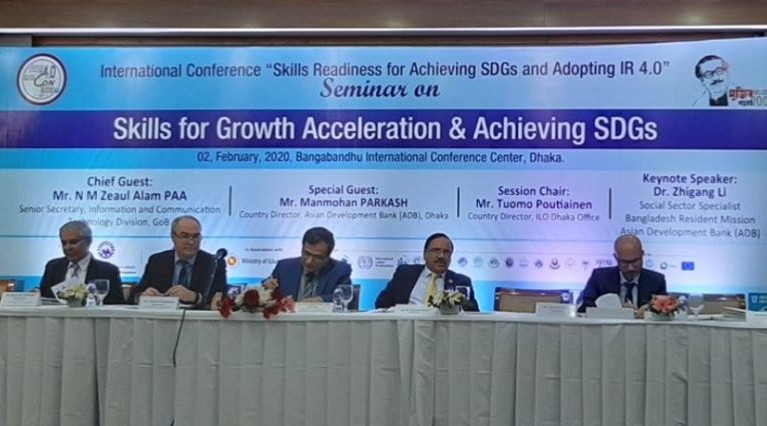Skills conference participants stress the relevance of TVET for skills readiness to achieve SDGs &adopt IR 4.0

The skills conference was organized in association with Ministry of Education, Government of the Peoples Republic of Bangladesh. Some 60 delegates from 25 countries of the world took part in this three-day long international conference. The number of Bangladeshi participants were 3000. They were from different national & international agencies, departments, development partners, employers, Non-government Organizations (NGOs), researchers, academicians, experts and government officials of TVET and Skills Development arena.
Tuomo Poutiainen, Country Director for ILO Bangladesh chaired a seminar on "Skills for growth acceleration and achieving SDGs" during this conference. Discussant said improved education, relevant skills and competencies, and access to decent jobs for youth can help to accelerate progress to achieve the Sustainable Development Goals.
This important assembly of academics, professionals and administrators exchanged and shared knowledge and experiences in a various sessions and meetings. In view of the deliberations made during all the sessions that took place among the conference, elaborate discussions were held to reach at the Dhaka Declaration.
Noting the progress made in Technical and Vocational Education and Training (TVET) in the Asia Pacific Region since the International Conference on TVET for Sustainable Development (Dhaka, April 30-May 2, 2015) and Asia-Pacific Conference on Education and Training (Kuala Lumpur, 3-5 August 2015), International Conference on Skills for the Future World of Work and TVET for Global Competitiveness (Dhaka, July 27-29, 2017). The participants agreed the relevance of TVET for Skills Readiness for Achieving SDGs & Adopting IR 4.0,
Reviewing the present status of TVET in terms of governance and legislative framework, social status of TVET graduates, National Qualification Framework (NQF), curriculum relevance with job market, industry institute linkage, employers demand, readiness and initiatives to face the challenges of 21st Century competitiveness.
Knowing the opportunities and threats of rapidly changing of skills due to changes of technology, Artificial Intelligence, it is decided to give more concentration on workforce forecasting & develop a strategic plan.
Understanding the importance of artificial intelligence & innovation, TVET curricula need to be amended, which can be further extended by introducing National Qualification Framework (NQF), establishment of a National TVET authority and setting up a “State of Arts” innovation center & business incubation center.
The delegates and participants offer their full consensus to the Declaration on the areas mentioned.
Skills 21 project is a joint initiative of the Government of Bangladesh and the International Labour Organization (ILO), funded by the European Union. The project seeks to increase productivity and employment opportunities through an environmentally conscious, inclusive, demand-driven, and interlinked skills development system responding to the needs of the labour market.